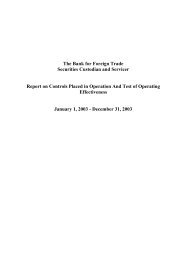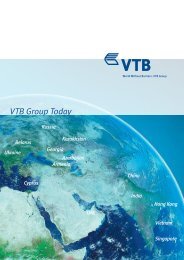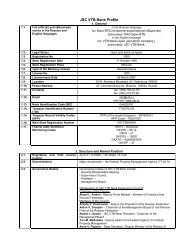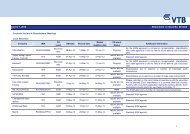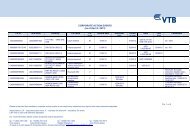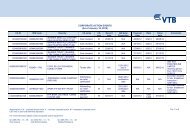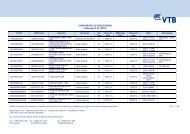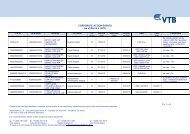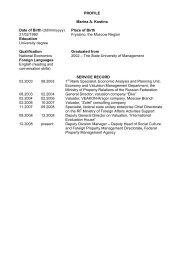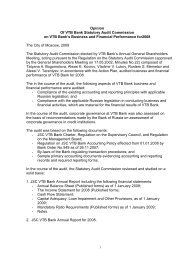Annual report 2011 - VTB
Annual report 2011 - VTB
Annual report 2011 - VTB
- No tags were found...
You also want an ePaper? Increase the reach of your titles
YUMPU automatically turns print PDFs into web optimized ePapers that Google loves.
<strong>VTB</strong> BankNotes to the Consolidated Financial Statements – 31 December <strong>2011</strong> and 2010(in billions of Russian Roubles)36. Contingencies, Commitments and Derivative Financial InstrumentsLegal proceedings. From time to time and in the normal course of business, claims against the Group are received.As at the <strong>report</strong>ing date the Group had several unresolved legal claims. Management is of the opinion that therewould be no material outflow of resources and accordingly no material provision has been made in these consolidatedfinancial statements.Tax contingencies. Transfer pricing legislation became effective in the Russian Federation on 1 January 1999. Thislegislation allows the tax authorities to make transfer pricing adjustments and impose additional tax liabilities inrespect of all “controlled” transactions, provided that the transaction price differs from the market price by more than20 percent. “Controlled” transactions include transactions with related parties, barter transactions, foreign tradetransactions and transactions with third (unrelated) parties with significant price fluctuations (i.e., if the price of suchtransactions differs from the prices on similar transactions by more than 20 percent within a short period of time). Inaddition, specific transfer pricing rules allow the tax authorities to make transfer pricing adjustments in respect ofsecurities and derivative transactions. There has been no formal guidance as to how some of the rules relating totransfer pricing legislation should apply.The new transfer pricing rules became effective from 1 January 2012. Compared to the previous Russian transferpricing rules, the new rules are more technically elaborate and, to a certain extent, better aligned with the internationaltransfer pricing principles developed by the OECD. The list of the “controlled” transactions under the new transferpricing legislation includes transactions with related parties and certain types of cross-border transactions. The newtransfer pricing rules may have a potential impact on tax costs arising from the pricing mechanism applied in“controlled” transactions, in particular, transactions with related parties located in and outside of Russia. The price ofthe “controlled” transactions should be confirmed by functional and benchmarking analysis as well as by the relevanttransfer pricing documentation which should be available for the Russian tax authorities.The tax authorities will have right to accrue additional tax liabilities if the prices under the “controlled” transactionsdiffer from those which would have been used by independent counterparties under similar conditions. However, it isstill unclear what effect the new transfer pricing rules may have on the Russian entities of the Group.The Group also operates in various jurisdictions and includes companies incorporated outside of Russia that aretaxed at different rates and under different legislation. Tax liabilities of the Group are determined on the basis thatthese companies do not have a permanent establishment in Russia and hence are not subject to Russian profits taxexcept for Russian tax withheld at source (i.e. dividend, interest, certain capital gains, etc.). Russian tax laws do notprovide detailed rules on taxation of foreign companies. It is possible that with the evolution of these rules andchanges in the approach of the Russian tax authorities, some or all of the foreign companies of the Group may betreated as having a permanent establishment in Russia and thus subject to Russian taxation in a manner broadlysimilar to the taxation of a Russian legal entity.The interpretations of the relevant authorities could differ and if the authorities were successful in enforcing theirinterpretation, additional taxes and related fines and penalties may be assessed, the effect, of which cannot be practicablyestimated, but could be significant to the financial condition of the Group. However, based upon Management’sunderstanding of the tax regulations, Management believes that its interpretation of the relevant tax legislation isreasonable and will be sustainable. Moreover, Management believes that the Group has accrued all applicable taxes.The Group includes subsidiaries incorporated and operating in various jurisdictions. In some jurisdictions where theGroup operates tax, currency and customs legislation as currently in effect is subject to varying interpretations, andchanges, which can occur frequently at short notice and may apply retroactively. Based upon its understanding of theapplicable tax regulations Management of the Group believes that based upon the best estimates Group subsidiarieshave paid or accrued all taxes that are applicable to their operations as of 31 December <strong>2011</strong>, in jurisdictions of theirincorporation, and complied with all provisions of laws and regulations in the jurisdictions to which the Group issubject. If however the relevant tax authorities differently interpret the applicable tax legislation as applied to thetransactions and activity of the Group, the tax position may be challenged; if the authorities were successful inenforcing their interpretation of these regulations, additional taxes, penalties and interest may be assessed, whichmay affect the financial position of the Group.The Russian Ministry of Finance on its official website placed a draft of Federal Law which defines the conditions ofexemption for companies reside in Russia from the tax agent’s obligations in case such companies pay income toforeign companies which issue Eurobonds. Such draft appeared due to the Russian Ministry of Finance opinion thatspecial purpose entities set up in Ireland to issue Eurobonds are not eligible for the benefits of the double tax treatybetween Ireland and Russia with regard to interest payments. If this view were to be enforced by the Russian taxauthorities (and potentially applied to other structured entities set up for issuing bonds from any foreign jurisdictionother than Ireland), the Group may face a fine at 20% of tax not withheld on interest paid on Eurobonds for the periodof <strong>2011</strong> and for prior periods and late payment interest. If such Federal Law is adopted as proposed by the RussianMinistry of Finance, the tax contingency will be fully remediated for <strong>2011</strong> and prior periods. At the moment the draft ofthe Law is in the State Duma and is planned to be adopted during 2012 year. Management believes its tax positionwith respect to the Eurobonds is sustainable and the resolution of this contingency will not have a material effect onthe consolidated financial statements of the Group.50



